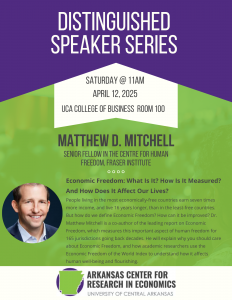Spring 2025
April 12, 2025: Matthew Mitchell, “Economic Freedom: What Is It? How Is It Measured? And How Does It Affect Our Lives?”
Dr. Matt Mitchell is a Senior Fellow in the Centre for Human Freedom. Prior to joining the Fraser Institute, Mitchell was a long-serving senior fellow at the Mercatus Center at George Mason University, where he remains an affiliated senior scholar. Mitchell received his PhD and MA in economics from George Mason University and his BA in political science and BS in economics from Arizona State University. His writing and research focuses on economic freedom, public choice economics, and the economics of government favoritism. Mitchell has testified before the U.S. Congress and several state legislatures. He has advised federal, state, and local government policymakers in the United States on both fiscal and regulatory policy. His research has been featured in numerous national media outlets, including the New York Times, the Wall Street Journal, the Washington Post, National Public Radio, and C-SPAN.
March 13, 2025: Anne Bradley, “Is Too Much Economic Freedom Bad for Women and Families?”
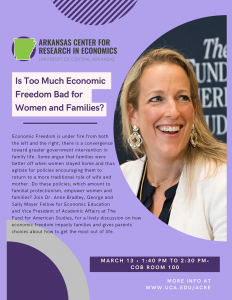
Dr. Anne Rathbone Bradley is the George and Sally Mayer Fellow for Economic Education and vice president of academic affairs at The Fund for American Studies. Through this position, Dr. Bradley works to enhance the impact and reach of TFAS and FTE economic education programs through courses, seminars, videos and social media. She also delivers lectures around the country and oversees curriculum development and evaluation for economics courses. In addition to her role as a fellow and vice president of academic affairs, Dr. Bradley continues to teach impactful economics courses to TFAS students and consistently receives outstanding marks in students’ post-program evaluations.
Previously, Dr. Bradley served as the vice president of economic initiatives at the Institute for Faith, Work & Economics, where she continues to research a systematic biblical theology of economic freedom. In addition to her work with TFAS, she is a professor of economics at The Institute for World Politics and Grove City College. She is a visiting professor at George Mason University and has previously taught at Georgetown University and Charles University in Prague. She is currently an Acton Affiliate scholar and a visiting scholar at the Bernard Center for Women, Politics & Public Policy. She is a lecturer for the Institute for Humane Studies and the Foundation for Economic Education.
Fall 2024
October 31, 2024: Nadine Strossen, “Does Free Speech Go Too Far? Should we censor hateful and extremist speech?”
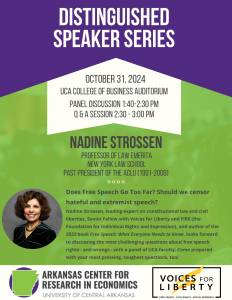 Nadine Strossen, the John Marshall Harlan II Professor of Law Emerita at New York Law School and past President of the American Civil Liberties Union (1991-2008), is a Senior Fellow with FIRE (the Foundation for Individual Rights and Education) and a leading expert and frequent speaker/media commentator on constitutional law and civil liberties, who has testified before Congress on multiple occasions. She serves on the advisory boards of the ACLU, Academic Freedom Alliance, Heterodox Academy, National Coalition Against Censorship, and the University of Austin. The National Law Journal has named Strossen one of America’s “100 Most Influential Lawyers,” and several other publications have named her one of the country’s most influential women. Her many honorary degrees and awards include the American Bar Association’s prestigious Margaret Brent Women Lawyers of Achievement Award (2017). In 2023, the National Coalition Against Censorship (an alliance of more than 50 national non-profit organizations) selected Strossen for its Judy Blume Lifetime Achievement Award for Free Speech. When Strossen stepped down as ACLU President, three (ideologically diverse) Supreme Court Justices participated in her farewell/tribute luncheon: Ruth Bader Ginsburg, Antonin Scalia, and David Souter.
Nadine Strossen, the John Marshall Harlan II Professor of Law Emerita at New York Law School and past President of the American Civil Liberties Union (1991-2008), is a Senior Fellow with FIRE (the Foundation for Individual Rights and Education) and a leading expert and frequent speaker/media commentator on constitutional law and civil liberties, who has testified before Congress on multiple occasions. She serves on the advisory boards of the ACLU, Academic Freedom Alliance, Heterodox Academy, National Coalition Against Censorship, and the University of Austin. The National Law Journal has named Strossen one of America’s “100 Most Influential Lawyers,” and several other publications have named her one of the country’s most influential women. Her many honorary degrees and awards include the American Bar Association’s prestigious Margaret Brent Women Lawyers of Achievement Award (2017). In 2023, the National Coalition Against Censorship (an alliance of more than 50 national non-profit organizations) selected Strossen for its Judy Blume Lifetime Achievement Award for Free Speech. When Strossen stepped down as ACLU President, three (ideologically diverse) Supreme Court Justices participated in her farewell/tribute luncheon: Ruth Bader Ginsburg, Antonin Scalia, and David Souter.
She is the author of HATE: Why We Should Resist It with Free Speech, Not Censorship (2018) and Free Speech: What Everyone Needs to Know® (2023). She is also the Host and Project Consultant for Free To Speak, a 3-hour documentary film series on free speech distributed on public television in 2023.
Her book Defending Pornography: Free Speech, Sex, and the Fight for Women’s Rights was named a New York Times “notable book” of 1995, and was republished in 2024 as part of the New York University Press “Classics” series. Her book HATE was selected as the “Common Read” by Washington University and Washburn University.
Strossen has made thousands of public presentations before diverse audiences around the world, including on more than 500 different campuses and in many foreign countries, and she has appeared on virtually every national TV news program. Her hundreds of publications have appeared in many scholarly and general interest publications.
Strossen graduated Phi Beta Kappa from Harvard College and magna cum laude from Harvard Law School. Before becoming a law professor, she practiced law in Minneapolis (her hometown) and New York City. She is a member of the Council on Foreign Relations.
Spring 2024
January 30: Jamie Bologna Pavlik
Jamie Bologna Pavlik is an associate professor of agricultural and applied economics in the Davis College of Agricultural Sciences and natural R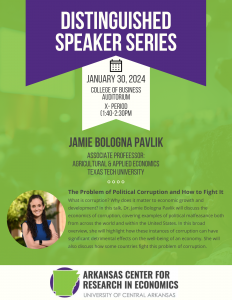 esources at Texas Tech University. Her presentation, The Problem of Political Corruption and How to Fight It, will ask, What is corruption? Why does it matter to economic growth and development? In this talk, Dr. Jamie Bologna Pavlik will discuss the economics of corruption, covering examples of political malfeasance both from across the world and within the United States. In this broad overview, she will highlight how these instances of corruption can have significant detrimental effects on the well-being of an economy. She will also discuss how some countries fight this problem of corruption.
esources at Texas Tech University. Her presentation, The Problem of Political Corruption and How to Fight It, will ask, What is corruption? Why does it matter to economic growth and development? In this talk, Dr. Jamie Bologna Pavlik will discuss the economics of corruption, covering examples of political malfeasance both from across the world and within the United States. In this broad overview, she will highlight how these instances of corruption can have significant detrimental effects on the well-being of an economy. She will also discuss how some countries fight this problem of corruption.
Dr. Bologna Pavlik earned her B.S. degree in business economics from Pennsylvania State University at Behrend and her Ph.D. in economics from West Virginia University, where she received the department’s Best Doctoral Student Award for the 2015-2016 year. She is currently a Research Fellow at the Free Market Institute at Texas Tech University.
February 29: Daniel J. Smith
Daniel J. Smith, Director of the Political Economy Research Institute and Professor of Economics at the Jones College of Business at Mid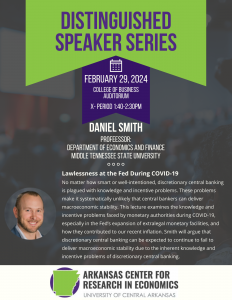 dle Tennessee State University, will discuss Lawlessness at the Fed During COVID-19. No matter how smart or well-intentioned, discretionary central banking is plagued with knowledge and incentive problems. These problems make it systematically unlikely that central bankers can deliver macroeconomic stability. Furthermore, discretionary central banking implicitly violates many of the jurisprudential norms of the rule of law. This lecture examines the knowledge and incentive problems faced by monetary authorities during COVID-19, especially in the Fed’s expansion of extralegal monetary facilities, and how they contributed to our recent inflation. Smith will argue that discretionary central banking can be expected to continue to fail to deliver macroeconomic stability due to the inherent knowledge and incentive problems of discretionary central banking.
dle Tennessee State University, will discuss Lawlessness at the Fed During COVID-19. No matter how smart or well-intentioned, discretionary central banking is plagued with knowledge and incentive problems. These problems make it systematically unlikely that central bankers can deliver macroeconomic stability. Furthermore, discretionary central banking implicitly violates many of the jurisprudential norms of the rule of law. This lecture examines the knowledge and incentive problems faced by monetary authorities during COVID-19, especially in the Fed’s expansion of extralegal monetary facilities, and how they contributed to our recent inflation. Smith will argue that discretionary central banking can be expected to continue to fail to deliver macroeconomic stability due to the inherent knowledge and incentive problems of discretionary central banking.
Dan also is an Adjunct Professor at the Owen Graduate School of Management at Vanderbilt University. He previously was the BB&T Professor of Economic Freedom in the Manuel H. Johnson Center at Troy University and taught at Vietnam National University, Hanoi, through a partnership with Troy University. He co-authored Money and the Rule of Law: Generality and Predictability in Monetary Institutions (Cambridge University Press), written with Peter J. Boettke and Alexander W. Salter, and The Political Economy of Public Pensions (Cambridge University Press – Elements Series in Austrian Economics), written with Eileen Norcross. Dan’s research, primarily on monetary institutions, public pensions, term limits, and regulation, has been published in many scholarly journals, including Public Choice, Constitutional Political Economy, and Economics of Governance. He has also researched the patricians of historic Venice, brawling soccer hooligans, and communities recovering from natural disasters.
March 28: Joy Buchanan
Joy Buchanan is an associate professor of quantitative analysis and economics in Samford University’s Brock School of Business. She teaches data analytics and economics courses. In her presentation, Should You Trust Chat GPT?, Dr. Buchanan will share her research on ChatGPT to demonstrate if or when you should use it.
Dr. Buchanan has published articles in peer-reviewed journals including Labour Economics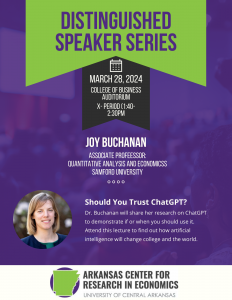 and Experimental Economics. Her research is in behavioral economics with a focus on applying experimental methods to issues in the labor market. Her work has been supported by the National Science Foundation and other organizations.
and Experimental Economics. Her research is in behavioral economics with a focus on applying experimental methods to issues in the labor market. Her work has been supported by the National Science Foundation and other organizations.
Dr. Buchanan holds a Ph.D. in Economics from George Mason University, Economics, an M.S. in Economic System Design from Chapman University, and a B.A. in Economics and Screenwriting from Chapman University.
Fall 2023
October 12: David Bernstein
 This past June, the Supreme Court held that the University of North Carolina’s and Harvard University’s preferential treatment of minority (from underrepresented groups) was illegal. This decision sent shockwaves through the academy, government, and private industry, especially because the Court went beyond expected opposition to racial preferences to call into question the entire scheme of racial and ethnic classification that has been widely used throughout American society since the government established these classifications over forty years ago. Professor Bernstein will discuss the Court’s holding and its implications for matters ranging from college admissions to scientific research, drawing from his most recent book, Classified, The Untold Story of Racial Classification in America.
This past June, the Supreme Court held that the University of North Carolina’s and Harvard University’s preferential treatment of minority (from underrepresented groups) was illegal. This decision sent shockwaves through the academy, government, and private industry, especially because the Court went beyond expected opposition to racial preferences to call into question the entire scheme of racial and ethnic classification that has been widely used throughout American society since the government established these classifications over forty years ago. Professor Bernstein will discuss the Court’s holding and its implications for matters ranging from college admissions to scientific research, drawing from his most recent book, Classified, The Untold Story of Racial Classification in America.
October 26: Emily Hamilton
 As an increasing number of households suffer from housing costs that strain their budgets, it’s abundantly clear that barriers to housing construction are causing affordability challenges. In this talk, Mercatus Center Senior Research Fellow Emily Hamilton discusses trends in state and local reforms to the regulations standing in the way of housing construction with a focus on policy changes that have been proven to make it feasible to build more housing at more affordable prices. Emily is the Director of the Urbanity Project at the Mercatus Center at George Mason University. Her research focuses on urban economics and land-use policy. She publishes both academic research and policy work. Her writing has appeared in outlets including the Washington Post and the Los Angeles Times, and she writes an occasional column at Governing. Hamilton has testified before several state legislatures as well as the U.S. House of Representatives. Hamilton serves on the Advisory Boards of Up for Growth and Cityscape, a journal published by the Department of Housing and Urban Development. She received her PhD in economics from George Mason University.
As an increasing number of households suffer from housing costs that strain their budgets, it’s abundantly clear that barriers to housing construction are causing affordability challenges. In this talk, Mercatus Center Senior Research Fellow Emily Hamilton discusses trends in state and local reforms to the regulations standing in the way of housing construction with a focus on policy changes that have been proven to make it feasible to build more housing at more affordable prices. Emily is the Director of the Urbanity Project at the Mercatus Center at George Mason University. Her research focuses on urban economics and land-use policy. She publishes both academic research and policy work. Her writing has appeared in outlets including the Washington Post and the Los Angeles Times, and she writes an occasional column at Governing. Hamilton has testified before several state legislatures as well as the U.S. House of Representatives. Hamilton serves on the Advisory Boards of Up for Growth and Cityscape, a journal published by the Department of Housing and Urban Development. She received her PhD in economics from George Mason University.
November 28 — Michael C. Munger
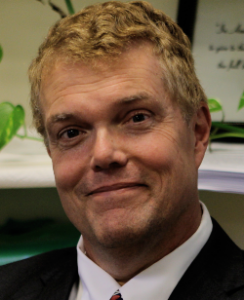 Professor Munger will explore the problem of using antitrust law and enforcement to control power and foster innovation in his presentation “Monopoly Power, Political Power, and the Problem of Platforms.” Professor Munger will address how, oftentimes, only a large firm with a reputation can solve the problems of “platforms.” In Munger’s recent books, a “platform” is defined as an entity that reduces the transaction costs of triangulation, transfer, and trust.
Professor Munger will explore the problem of using antitrust law and enforcement to control power and foster innovation in his presentation “Monopoly Power, Political Power, and the Problem of Platforms.” Professor Munger will address how, oftentimes, only a large firm with a reputation can solve the problems of “platforms.” In Munger’s recent books, a “platform” is defined as an entity that reduces the transaction costs of triangulation, transfer, and trust.
Professor Munger received his Ph.D. in Economics at Washington University in St. Louis in 1984. He is currently director of the interdisciplinary PPE Program at Duke University. He has won three University-wide teaching awards (the Howard Johnson Award, an NAACP “Image” Award for teaching about race, and admission to the Bass Society of Teaching Fellows. Munger’s recent books include “Choosing in Groups” (coauthored with his son, Kevin Munger) and “The Thing Itself,” both in 2015. His research interests include the study of the morality of exchange and the working of the new “Middleman Economy.” Much of his recent work has been in philosophy, examining the concept of truly voluntary exchange, a concept for which he coined the term “euvoluntary.” His newest book addresses the sharing economy, and is entitled “Tomorrow 3.0.”
Spring 2023
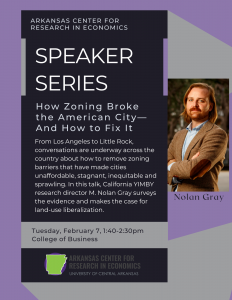 Nolan Gray – How Zoning Broke the American City and How to Fix it
Nolan Gray – How Zoning Broke the American City and How to Fix it
Tuesday, February 7, 1:40 p.m. College of Business auditorium
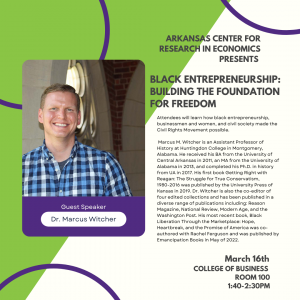 Dr. Marcus M. Witcher — Black Entrepreneurship: Building the Foundation for Freedom
Dr. Marcus M. Witcher — Black Entrepreneurship: Building the Foundation for Freedom
Thursday, March 16, 1:40 p.m., College of Business Room 100
In this talk, Dr. Witcher discusses the efforts by black businessmen and businesswomen, entrepreneurs, mutual aid societies, and voluntary organizations in creating networks of black Americans who contributed to the success of the Civil Rights Movement in the 1950s and 1960s. He argues that without entrepreneurship and civil society it is unlikely that the CRM would have been successful. He discusses the efforts of Booker T. Washington, W.E.B. DuBois, Madam C.J. Walker, The National Negro Business League, the NAACP, the Black Elks, John Johnson, TRM Howard, and others in this talk. It is largely taken from chapter six of his book, Black Liberation Through the Marketplace (co-authored with Rachel Ferguson).
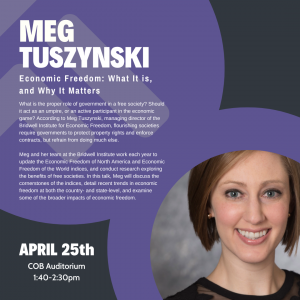 Meg Tuszynski – Economic Freedom: What It Is, and Why It Matters
Meg Tuszynski – Economic Freedom: What It Is, and Why It Matters
Tuesday, April 25, College of Business auditorium
What is the proper role of government in a free society? Should it act as an umpire, or an active participant in the economic game? According to Meg Tuszynski, managing director of the Bridwell Institute for Economic Freedom, flourishing societies require governments to protect property rights and enforce contracts, but refrain from doing much else.
This isn’t just conjecture. Meg and her team at the Bridwell Institute work each year to update the Economic Freedom of North America and Economic Freedom of the World indices, and conduct research exploring the benefits of free societies. In this talk, Meg will discuss the cornerstones of the indices, detail recent trends in economic freedom at both the country- and state-level, and examine some of the broader impacts of economic freedom.
To see more past speakers, you can view our speaker series archive here.

